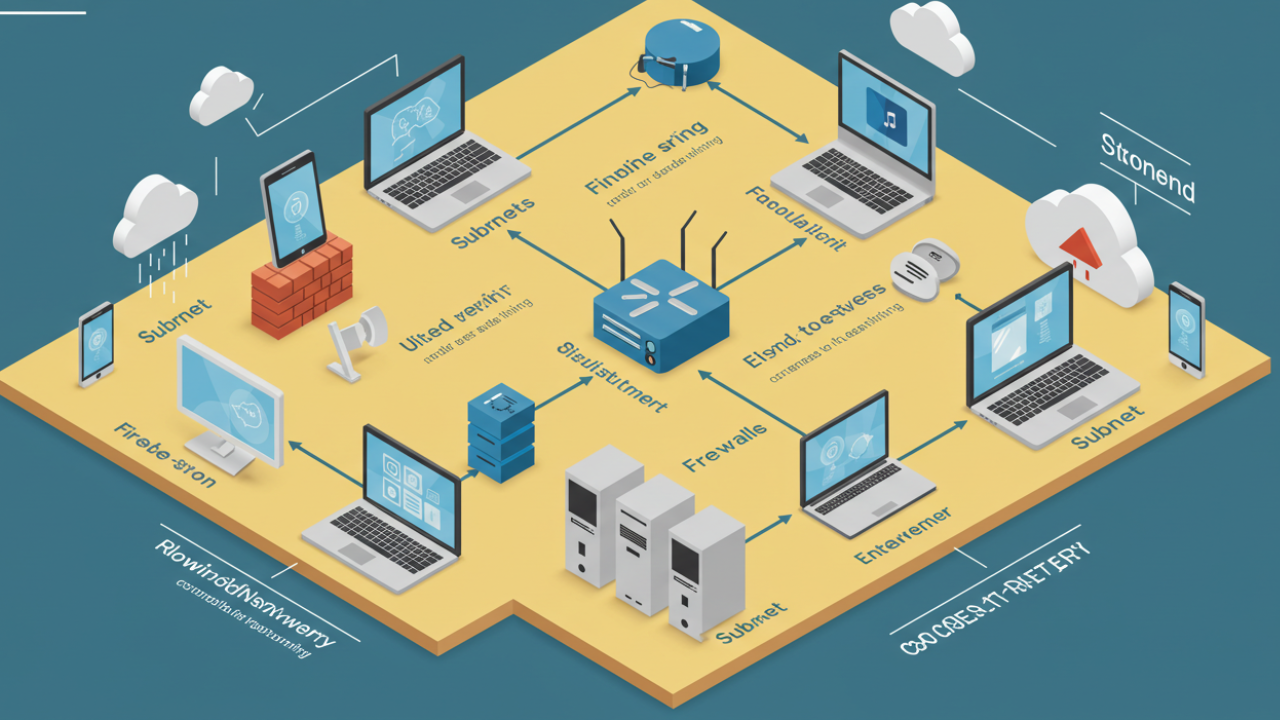In today’s digital landscape, network security is one of the most crucial aspects of safeguarding personal, corporate, and governmental data. As the number of cyber threats continues to grow, the demand for skilled professionals in network security has surged. This has resulted in a variety of high-paying IT jobs in network security, offering excellent opportunities for those seeking a rewarding career in technology.
Key Takeaways
-
Network security is a rapidly growing field with numerous high-paying opportunities.
-
There are a variety of specialized roles, such as Network Security Engineer, Ethical Hacker, and CISO, each offering competitive salaries.
-
Obtaining the right certifications and experience can significantly boost your career prospects.
-
Industry demand for network security professionals is projected to continue growing, especially in finance, healthcare, and government sectors.
-
Continuous learning and staying updated on the latest security trends is crucial to advancing in network security roles.
What is Network Security?
Network security refers to the measures and protocols used to protect a computer network from unauthorized access, attacks, or damage. It involves the use of hardware, software, and policies to ensure the integrity, confidentiality, and availability of data and systems. As a network security professional, your role will often involve monitoring network traffic, setting up firewalls, implementing security measures, and ensuring compliance with various security regulations.
The field of network security is crucial for businesses, as it helps protect sensitive data from cyberattacks. This is why high-paying IT jobs in network security are increasingly in demand. If you’re interested in entering this field, you’re stepping into a role that offers not just security for networks, but also a stable and lucrative career.
High-Paying IT Jobs in Network Security
Network security offers a wide array of job roles that come with competitive salaries. Let’s explore some of the high-paying IT jobs in network security that you should consider:
1. Network Security Engineer
What They Do:
A Network Security Engineer is responsible for the design, implementation, and maintenance of security measures to protect the network infrastructure of an organization. They focus on firewalls, VPNs, intrusion detection systems, and other security tools to prevent cyberattacks.
Salary Range:
In the U.S., the average salary for a Network Security Engineer is between $85,000 and $130,000 annually, depending on experience and certifications.
Key Skills:
-
Knowledge of network protocols and security infrastructure.
-
Expertise in firewall configuration and VPN management.
-
Familiarity with intrusion detection and prevention systems (IDS/IPS).
2. Information Security Analyst
What They Do:
An Information Security Analyst monitors and defends an organization’s information systems from potential threats. They also conduct risk assessments, perform penetration testing, and ensure compliance with industry standards.
Salary Range:
On average, Information Security Analysts earn between $75,000 and $120,000 annually, with senior-level positions exceeding $150,000.
Key Skills:
-
Strong knowledge of cybersecurity laws and regulations.
-
Penetration testing and vulnerability assessment skills.
-
Risk management and incident response planning.
3. Cybersecurity Consultant
What They Do:
A Cybersecurity Consultant provides expert advice to organizations looking to improve their security posture. These professionals help identify security weaknesses and recommend solutions to mitigate risks. Cybersecurity consultants often work with multiple clients, offering services tailored to their specific needs.
Salary Range:
Cybersecurity Consultants can earn between $90,000 and $150,000 per year, depending on experience and the complexity of projects.
Key Skills:
-
Expertise in risk management and compliance frameworks.
-
Deep understanding of various security technologies.
-
Ability to communicate complex security concepts to non-technical stakeholders.
4. Ethical Hacker (Penetration Tester)
What They Do:
Ethical Hackers, or Penetration Testers, simulate cyberattacks on networks and systems to identify vulnerabilities. They are hired by organizations to “break into” their systems legally to pinpoint weak spots before malicious hackers can exploit them.
Salary Range:
Ethical Hackers typically earn between $80,000 and $130,000 annually. However, top-tier professionals can earn upwards of $150,000 per year.
Key Skills:
-
Expertise in hacking tools and techniques.
-
Strong understanding of network security protocols.
-
Knowledge of compliance and regulatory standards.
5. Chief Information Security Officer (CISO)
What They Do:
A Chief Information Security Officer (CISO) is a senior-level executive responsible for overseeing the entire cybersecurity strategy of an organization. The CISO ensures that the organization’s data, networks, and systems are secure from cyber threats.
Salary Range:
CISOs are among the highest-paid professionals in network security, with salaries typically ranging from $140,000 to $250,000 annually, depending on the company size and scope.
Key Skills:
-
Leadership and management skills.
-
Strategic planning and risk management.
-
Extensive experience in network security technologies.
How to Get Started in Network Security
To secure one of the high-paying IT jobs in network security, you’ll need a combination of education, certifications, and hands-on experience. Here’s how to start:
1. Educational Pathways
Most network security professionals start with a degree in computer science, information technology, or cybersecurity. While a formal degree is beneficial, many roles also accept relevant certifications and practical experience.
Recommended Degrees:
-
Computer Science
-
Information Technology
-
Cybersecurity
2. Certifications to Pursue
Certifications are an essential part of advancing in network security. Here are a few certifications that can boost your career prospects:
| Certification | Description | Average Salary Increase |
|---|---|---|
| CISSP | Certified Information Systems Security Professional | +$10,000 |
| CEH | Certified Ethical Hacker | +$8,000 |
| CompTIA Security+ | Entry-level certification in cybersecurity | +$6,000 |
| Cisco CCNP Security | Specialized in Cisco security systems | +$9,000 |
Essential Certifications:
-
Certified Information Systems Security Professional (CISSP)
-
Certified Ethical Hacker (CEH)
-
CompTIA Security+
3. Gain Practical Experience
Hands-on experience is vital in network security. Start by participating in internships, working on personal projects, or volunteering for organizations in need of cybersecurity assistance. You can also participate in bug bounty programs or engage in Capture The Flag (CTF) challenges to hone your skills.
4. Build a Strong Resume
When building your resume, highlight the relevant certifications, technical skills, and hands-on experience you have. Focus on demonstrating your ability to solve security problems and implement effective solutions.
Essential Skills for Success in Network Security
Technical Skills:
To excel in high-paying IT jobs in network security, you need to master the following technical skills:
-
Firewall and VPN management
-
Intrusion Detection Systems (IDS)
-
Cryptography
-
Security protocols (IPSec, SSL, etc.)
Soft Skills:
Network security professionals must also possess strong communication, problem-solving, and critical thinking skills. You’ll need to be able to explain complex technical issues to non-technical stakeholders, write clear reports, and work well under pressure.
The Job Market Outlook for Network Security Professionals
The demand for network security professionals is growing rapidly. According to the U.S. Bureau of Labor Statistics, employment in the field of information security is expected to grow by 35% from 2021 to 2031—much faster than the average for all occupations.
Industries Hiring Network Security Professionals:
| Industry | Demand for Network Security Professionals |
|---|---|
| Healthcare | High demand due to patient data protection requirements |
| Finance | Critical for protecting financial transactions and client data |
| Government | Ensuring the security of national security systems |
| Tech Companies | Essential for protecting enterprise networks and data |
Tips for Advancing Your Career in Network Security
1. Stay Updated
Regularly read cybersecurity blogs, attend webinars, and follow industry news to stay informed about the latest threats, technologies, and security tools. Continuous learning is crucial to staying competitive.
2. Pursue Advanced Certifications
Earning certifications like CISSP, CEH, or CompTIA Security+ enhances your credibility and expertise, helping you stand out to employers and move into more advanced roles.
3. Network with Professionals
Attend cybersecurity conferences, join professional organizations, and actively engage on platforms like LinkedIn to build valuable connections and expand your professional circle.
4. Build a Personal Brand
Share your knowledge through a blog, YouTube channel, or speaking engagements to showcase your expertise, increase visibility, and establish yourself as a thought leader in network security.
5. Seek Leadership Opportunities
Take on leadership roles within projects or teams to demonstrate your managerial skills. Transitioning into a leadership position like CISO can boost both your salary and influence within an organization.
My Opinion
In conclusion, high-paying IT jobs in network security offer a promising and rewarding career path for individuals passionate about technology and cybersecurity. With the right combination of education, certifications, and hands-on experience, you can break into this thriving field and land one of these lucrative positions.
As cyber threats continue to increase, the demand for skilled network security professionals will only grow. By investing in your skills and continuously learning, you’ll be well-equipped to take advantage of the many opportunities available in this dynamic and essential industry.



















Leave a Reply